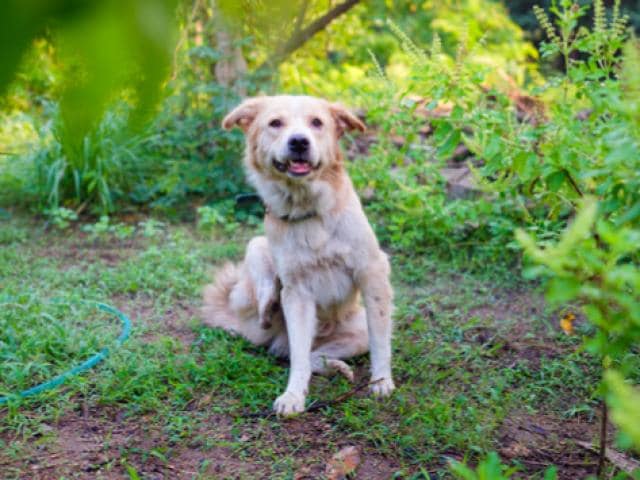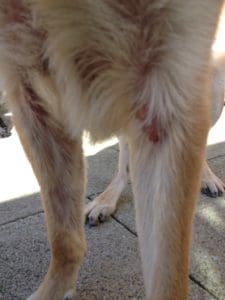
For sensitive dry skin. Grass allergies can be seen in any species gender and age of dog but is most commonly seen in dogs over the age of three months.

Dogs that are allergic to grass may also have watery eyes noses and scratchy throats but the symptoms are less pronounced than in humans.
Grass allergy dog. Grass allergies can be seen in any species gender and age of dog but is most commonly seen in dogs over the age of three months. Grass allergies are more common in certain breeds including German Shepherds Bulldogs Pugs Retrievers Miniature Schnauzers Setters and Irish Terriers. In most cases grass allergy in dogs is manifested in your dogs head face armpits feet and abdomen.
Dogs suffering from grass allergy often gnaw and lick their paws. Diagnosis of Grass Allergies among Dogs. If you are suspecting your dog has a grass allergy you should visit your vet for your pups checkup.
Grass allergies in dogs are caused by pollen which is the powdery yellow material that you see all over everything in the spring and summer. This powder is the substance that flowers and grasses put out to be transported from plant to plant by the birds bees or wind. There are several ways your dog can be exposed to grass pollen.
Canines allergic to grass and flora usually develop dermatitis itchy patches of skin. It is usually localized to one or two spots but can spread all over the dogs body. Dogs that are allergic to grass may also have watery eyes noses and scratchy throats but the symptoms are less pronounced than in humans.
Grass allergies also known as pollen allergies are the most common type that appear in dogs. The pollen is absorbed in the dogs skin and can cause an allergic reaction. The pollen is mostly spread through direct contact with grass though it also can be transferred indirectly from people bringing it in from the outside.
Canines allergic to grass and flora usually develop dermatitis itchy patches of skin. It is usually localized to one or two spots but can spread all over the dogs body. Dogs that are allergic to grass may also have watery eyes noses and scratchy throats but the symptoms are less pronounced than in humans.
The Grass Allergy. The most common allergy and one of the hardest to get rid of. Over half of the canine population has a grass allergy it just depends if your dogs flares up or not and sadly it may never go away.
Your dog comes in from being outside and immediately starts licking and biting at themselves. If your dog is allergic to grass there are several ways you can help him feel better. You can give him steroids antihistamines omega-3 a fish and sweet potato diet colloidal oatmeal floral oils and aloe vera.
Always consult with a veterinarian to be sure it is not a serious condition. What does a grass allergy look like on a dog. Canines allergic to grass and flora usually develop dermatitis itchy patches of skin.
It is usually localized to one or two spots but can spread all over the dogs body. Dogs that are allergic to grass may also have watery eyes noses and scratchy throats but the symptoms are less pronounced than in. A dogs symptoms from grass allergies can be anywhere from hardly noticeable to obvious discomfort.
Similar to people a dog with grass allergies may have watery eyes runny noses and scratchy throats. In more severe cases a dog may experience swollen paws vomiting diarrhea scabbed skin and excessive licking. Grass allergy does not occur when dogs eat grass.
Similarly it has no relation to the grass underfoot. In fact this problem is caused by the seasonal pollen that grass releases when it matures. However other pollen-borne allergies can affect dogs and if you notice any of the symptoms it is important to have your dog tested.
Kikuyu grass allergies in dogs are caused by grass pollen which occurs during the spring and summer. It is a yellow powder with microscopic spores and can affect your dog if exposed. Breathed into the lungs.
From owners guests and their belongings. Licking and chewing on fur and paws. Symptoms of grass allergies in dogs.
Certain breeds of dogs such as Golden Retrievers. Pit Bulls and English Cocker Spaniels are more vulnerable to an allergic reaction to grass but any dog can develop an allergy to pollen. Check your furry friend for signs of the following common symptoms.
Red sore and watery eyes. Totally natural pet care. 100 bio-degradable and cruelty free.
Fragrance and allergen free. Wipe away dirt and odors. Easy wipe-off for grass pollen.
For sensitive dry skin. Made for pets with food grass flea bite allergies. Can Dogs Be Allergic to Grass.
Yes your dog can be allergic to grass. Just like humans suffer from seasonal allergies dogs can too. This is a big issue in spring especially because of the new plants releasing pollen into the air.
But pollen isnt the only thing that triggers a grass allergy in dogs. What to do for grass allergies in dogs. Limit access to grassed areas during the dogs allergy season.
Wipe down or bath your dog after exercise. Avoid access for 24 hours after mowing saps contain allergen How To Treat Allergies In Dogs. Theres a lot you can do and a lot your vet can do.
Please visit our pages on. Common symptoms of grass allergies include irritated skin either in isolated patches or spread all over a dogs body. Watch for redness hot spots and bare patches from constant scratching licking and biting.
One of the most challenging aspects of grass allergies in dogs is that they can show up out of the blue even if you dont have a yard. Treatment of Grass Allergies in Dogs The best treatments for any allergy in dogs are corticosteroids antihistamines and a topical ointment such as a cortisone cream or gel. Additionally a special shampoo may be prescribed to decrease the itching and an antibiotic to prevent infection.
A Case of Atopic Dermatitis. There are allergies and allergies when it comes to dogs and a main cause of dogs allergic to grass falls under the canine atopic dermatitis department. Also known as atopy atopic dermatitis is basically a hypersensitivity to something that is present in the dogs environment whether inhaled or through direct contact with the skin.
Grass allergies are triggered by pollen that is air born or disturbed by your Frenchie. If the result is positive the veterinarian will send your Frenchies a Serum allergy test to a pet dermatologist. This test is performed by a pet dermatologist.
It is known to be the most reliable test for topical allergens. Dog Food AllergiesCommon Foods A Dog Can Be Allergic To. The most common foods for dogs to be allergic to are dairy beef eggs wheat lamb chicken pork soy fish and rabbit.
Contact Allergies In DogsContact Allergies Can Cause Dog Skin Problems. This dog has Contact Dermatitis from grass allergy. It is painful and itchy.
Other body parts can be affected ears tummy any part that comes into contact.